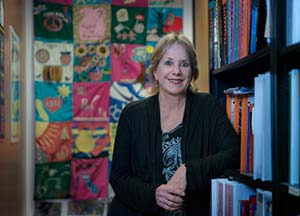$14.7 Million Grant Will Help Literacy Outreach Program Expand
- By Dian Schaffhauser
- 11/15/18

A grant from the Department of Education will help University of California, Irvine professor of education, Carol Booth Olson, scale the Pathway to Academic Success Project. Source: Steve Zylius/UCI
A literacy outreach program for grades 7-11 that has found success in Southern California has just been funded to expand to six additional states, with the intent of eventually taking it nationwide. The "Pathway to Academic Success Project," run out of the University of California, Irvine (UCI), received a five-year, $14.7 million from the Department of Education's Office of Innovation & Improvement.
The program was initially launched more than two decades ago in the Santa Ana Unified School District by principal investigator Carol Booth Olson, a professor of education at UCI. The project worked to close the achievement gap for English learners by training teachers in the "pathway intervention," an instructional approach that uses cognitive strategies or "thinking tools" culled from experienced readers and writers to help students understand, interpret and write analytical essays about nonfiction texts. Eventually, the initiative grew to 10 school districts in the region.
With each iteration of the program, students showed improvements. For example, during one phase of the previous program, grade 10 English learners in the "treatment" group passed the California High School Exit Exam at 20 percentage points higher than the state pass rate. Evidence from a more recent study, co-authored by Olson, suggested that "students of all races and ethnicities benefitted from the Pathway intervention."
The expanded program will deliver professional development to teachers working with English learners, as well as students who are at risk of failure or performing far below grade level. And it will be extended to Arizona, Illinois, Minnesota, Nevada, Texas and Wisconsin.
The expansion will reach 240 teachers and 109,200 students in school districts affiliated with the National Writing Project. It will include a two-year field trial of PD, summer institutes for instructors and course modules designed to help English learners with their writing practices.
The project outcomes will be assessed through a combination of on-demand tests of academic writing, standardized test scores and graduation rates.
"Pathway is based on the science of education," said Olson in a statement. "Cognitive strategies instruction reinforces the connections between reading and writing and empowers teachers with the tools they need to help kids. It's critical to close the achievement gaps among high-needs students by developing their analytical and comprehension skills so they're better prepared for postsecondary education."
The research team also includes Robin Scarcella, a UCI professor of academic English, and Rebecca Black, an associate professor of informatics. Scarcella is a linguist who brings expertise in understanding the language form and structure of students who are English learners; Black specializes in creating technologies to assist in the teaching of academic writing.
A narrative of the project is available on the Department of Education website, as is an abstract.
About the Author
Dian Schaffhauser is a former senior contributing editor for 1105 Media's education publications THE Journal, Campus Technology and Spaces4Learning.